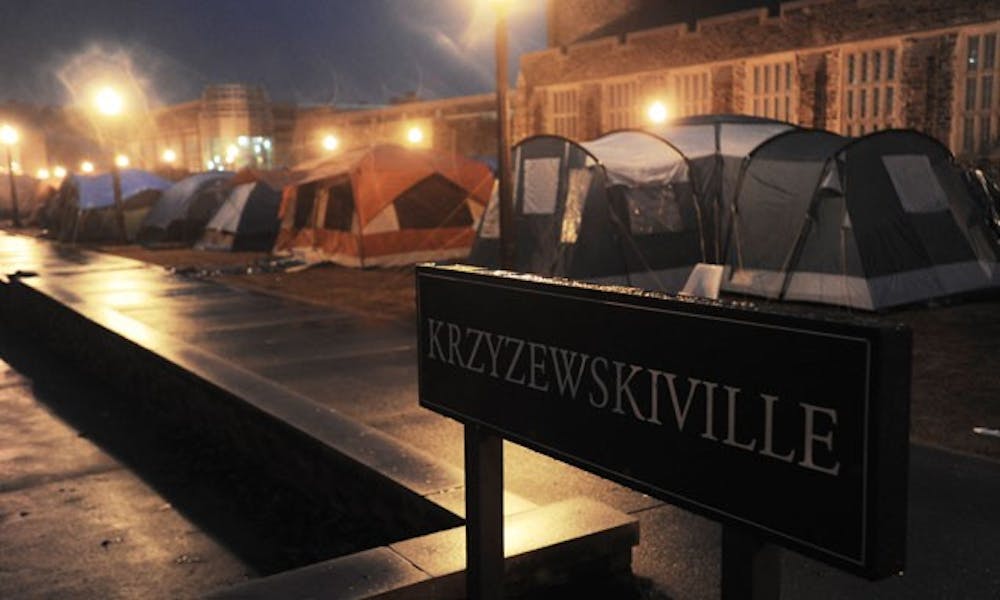This basketball season, securing a coveted spot at the Duke-UNC game may involve more than tenting in Krzyzewskiville.
Changes to tenting regulations and a range of other new proposals affecting Cameron Indoor Stadium’s student section—including the introduction of a “Greek Night”—have recently sparked debate among undergraduates.
In a town hall meeting Sunday, Head Line Monitor Zach White, a senior, considered various proposals to determine the best way to sequence tents in K-ville.
White said this year, University administrators will ban pre-blue tenting over Winter Break. Instead, White proposed that tent ordering could be based on a group’s performance in various competitions. These events will vary widely, ranging from basketball trivia to designing creative signs and engaging in athletic contests.
In past years, Cameron Indoor Stadium’s craziest have pitched tents as early as Christmas to secure prime realty for the Spring game against the University of North Carolina at Chapel Hill.
At Sunday’s forum, several students raised concerns regarding the proposal’s effectiveness.
“[K-ville] is the one spot on campus where we’re not competing with our brains,” junior Edwin Coleman said.
By adding intelligence contests to basketball season, tenting would become just another academic competition, he added.
Senior John Burton voiced similar objections to the program. He said it would be extremely difficult to distinguish “true crazies” from those who simply studied the night before. Inevitably, students who crammed a day in advance might outperform the more dedicated fans, whose knowledge grew naturally because of their growing commitment to the team, Burton added.
In response to such concerns, White suggested reverting to more traditional methods for sequencing tents. Starting Jan. 24, groups who feel the need to secure the best spots at the Duke-UNC game may participate in a very difficult week of tenting. During “hell week,” White said all 12 members of a group may be required to sleep outside—without tents.
For the majority of students, however, tenting will begin Jan. 30.
Duke Student Government approved the new start date in a unanimous vote Wednesday night. The governing body also approved reducing the number of students required to sleep in a tent each night from eight to six. Additionally, tenters will see later hours for “curfew” Thursday through Saturday nights and an increase in the minimum temperature required for students to be freed from tenting duties—an increase from 20 to 25 degrees.
Tenting regulations aside, line monitors and basketball officials have discussed other ways to promote attendance, such as instituting theme nights.
Associate Head Basketball Coach Steve Wojciechowski said in an interview that the basketball program has discussed the proposal with a number of student groups.
“We want [Cameron] to be a place where everyone in the Duke community comes together, whatever their title or affiliation,” Wojciechowski said.
The first theme night, Greek Night, is slated to take place Nov. 13, which is a home game against UNC-Greensboro. Like the current practice of Senior Night, Greek Night would involve giving priority seating to students in the themed group—in this case, a fraternity or sorority. After the first 300 “die-hard” fans enter, regardless of greek affiliation, White said greek students would be admitted to the stadium. Afterward, the remaining stadium seats would be filled by all other students.
Greek Night’s proposal for the first home game has proven especially controversial for some students.
Wojciechowski said he has met with several fraternities and noted that other members of the basketball program have spoken to sororities.
“Over the course of the school year and the season, we are going to meet with as many [groups] as we can,” he said.
Some students, however, said Greek Night actually deters independents, freshmen and other groups from attending the games.
“Why should [greeks] be guaranteed seating at the game?” said Kelvin Gu, a junior and an independent. “I don’t see why they are any different from anyone else.”
Sophomore Tom Burr, also an independent, voiced similar concerns about Greek Night.
“First of all, we need to call it what it really is—privileged white kid night,” he said. “Too many times you go to game nights and you see sorority girls asking who the players are and leaving at half time, so it doesn’t really matter whether Greek Night increases attendance or not.”
Sophomore Pete Schork, DSG vice president for athletics and campus services, said the basketball department is working in students’ best interest by attracting greeks. If done properly, Greek Night will not exclude independents because they will be allowed to enter the stadium before and after greek students, Schork added.
In addition, Schork said the department is targeting groups that have been “almost excluded” from basketball season. He noted that rush and pledging directly coincide with basketball season, and students sometimes pass up tenting to honor these commitments.
On at least one proposal at Sunday’s forum, however, approval was unanimous. Line monitors and basketball officials discussed sponsoring a kick-off party Jan. 30 to signal the start of the tenting season. Following the day’s events, the celebration would take place in K-ville after dark.
“It’s going to be one epic night,” White said.
Get The Chronicle straight to your inbox
Signup for our weekly newsletter. Cancel at any time.

